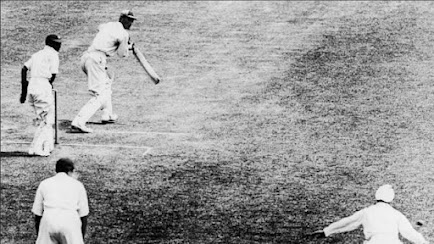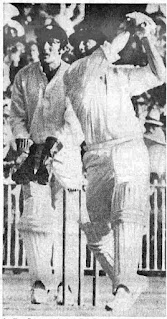Origin of
Cricket
The first
definite written reference is from the end of the 16th century in south-east
England. However, it became an established sport in England in the 18th century
and developed globally in the 19th and 20th centuries. International formal Test
cricket matches have been played since 1877. It has been suggested that
"creag" was an Old English word for cricket, but expert
opinion is that it was an early spelling of "craic", meaning
"fun and games in general".
According
to Heiner Gillmeister, a European language expert of the University of Bonn, "cricket"
derives from the Middle Dutch phrase for hockey, met de (krik ket)sen (i.e "with the stick chase").
Introduction of Laws in Cricket
In 1728, drew
up Articles of Agreement by the Duke of Richmond and Alan Brodick to
determine the code of practice in a particular game and this became a common
feature.
In 1744,
the Laws of Cricket were codified for the first time and then amended
in 1774, the codes were drawn up by the so-called "Star and Garter
Club" whose members ultimately founded the Marylebone Cricket Club at Lord's in
1787. The MCC immediately became the custodian of the Laws and has made
periodic revisions and recodifications subsequently.
Balls per
over
During
most of the 19th-century standard overs were made up of four
deliveries. In 1889 five-ball overs were introduced in first-class cricket,
with a move to generally use six-ball overs in 1900.
In the
20th century, eight-ball overs were used at times in a number of countries.
Since the 1979/80 six balls per over have been used worldwide, and the
most recent version of the Laws only permits six-ball overs.
Beginning
of International Cricket
The first
ever international cricket match was played between the U.S and Canada in 1844 at
the grounds of the St George's Cricket Club in New York.
Origin of
ICC
The Imperial Cricket Conference was founded in 1909 with with England, Australia and South Africa as the founder member. At the initial suggestion of Pakistan, the ICC was expanded to included non-Test playing countries form 1965, with Associate members being admitted. At the same time organisation changed its name to the International Cricket Conference.
The first
limited-overs World Cups were played during the 1970s and in 1989 the ICC
renamed itself the International Cricket Council.
Beginning
of Test cricket
Test
cricket is a form of first-class cricket played at international
level between teams representing full member countries of the International
Cricket Council (ICC). In the past, some Test matches had no time limit
and were called Timeless Tests. Now a match consists of four innings (two
per team) and is scheduled to last for up to five days.
The term
"test match" was coined during the English tour of Australia in
1861–62 but in a different context. Test cricket did not become an
officially recognised format until the 1890s, but many international matches
since 1877 have been retrospectively awarded Test status.
There are
now twelve full ICC member countries playing Test cricket. Day/night Tests were
permitted by the ICC in 2012 and the first day/night match was between Australia
and New Zealand at the Adelaide Oval in November 2015.
World
Series Cricket
In 1977, the
money problems of top cricketers were also the root cause of another cricketing
crisis arose when the Australian media tycoon Kerry Packer fell out
with the Australian Cricket Board over TV rights. Packer signed agreement with several
best players of the world for privately run cricket league called World Series
Cricket, outside the structure of international cricket. Packer hired some of
the banned South African players and allowed them to show off their skills in
an international arena against other world-class players. The schism lasted
only until 1979, long-term results of World Series Cricket have included the
introduction of significantly higher player salaries and innovations such as
coloured kit and night games.
One Day International (ODI)
A One
Day International (ODI) is a form of limited overs cricket, played
between two teams with international status, in which each team faces a fixed number
of overs, currently 50, with the game lasting up to 9 hours. One Day
International (ODI) is also called Limited Overs Internationals (LOI).
The first ODI was played on 5 January 1971 between Australia and England at
the Melbourne Cricket Ground. It was tried simply as an experiment and to
give the players some exercise, but turned out to be immensely popular.
Earlier, ODIs
were played in white-coloured kits with a red-coloured ball however, later on coloured
kits and a white ball became more usual over the time which led the end of ODIs
with red-coloured ball in 2001. The International Cricket Council organised the
first Cricket World Cup in England in 1975. The Cricket World
Cup, generally held after every four years, is played in this format.
In the
late 1970s, Kerry Packer’s World Series Cricket competition
introduced many of the features of One Day International cricket, including
coloured uniforms, matches played at night under floodlights with a white ball
and dark sight screens, and, used developing technologies in cricket. The first
of the matches with coloured uniforms was played on 17 January 1979 between
Australia and West Indians at VFL Park in Melbourne.
Twenty20 (T20)
Format of Cricket
Twenty20 (T20)
is a shortened game format of cricket. Stuart Robertson, the marketing
manager of the ECB, proposed a 20-over-per-innings game to county chairmen in
2001 and they voted 11–7 in favour of adopting the new format. At the
professional level, it was introduced by the England and Wales Cricket
Board (ECB) in 2003 for the inter-county Twenty20 Cup. A typical
Twenty20 game is completed in about two and a half hours, with each innings
lasting around 70 minutes and an official 10-minute break between the innings.
The first Twenty20 match held at Lord's, on 15 July 2004 between Middlesex and Surrey. Twenty20 is one of the three current forms of cricket recognised by the International Cricket Council (ICC) as being at the highest international or domestic level. International Cricket Council (ICC) introduced Twenty20 World Cup in 2007 and ICC Champion trophy in 2017.







